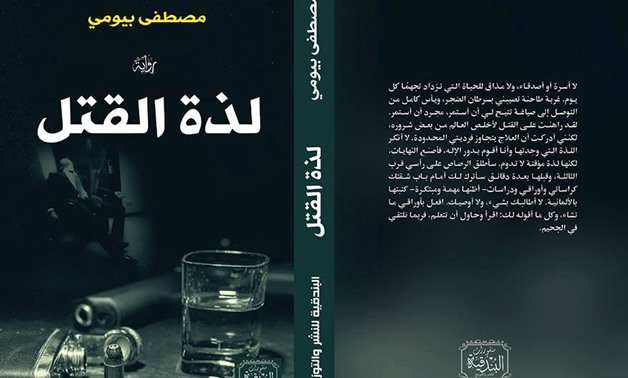
'Lazet El Qatl' (The Pleasure of Murder) - Photo courtesy of author Mostafa Bayoumi official Facebook page
Cairo – 25November 2017: A novel that gathers all the philosophy and political views of its author is a beautiful read. Egyptian writer Mostafa Bayoumi integrated these concepts in his new novel “Lazet El Qatl” (“The Pleasure of Murder”). The story is told through the killer’s diaries, left for his estranged neighbor to find and read after he has committed suicide.
The main character is a disturbed person, he despises his father, has intimate relations with his step-mother, who is much younger than his father and cheats on the older husband repeatedly. A philosophy teacher, Gamal – named after Gamal Abdel Nasser – is a loner who hates his name. He believes in communism then refutes it, then believes in Nietzscheism, despising all the characters in the novel with the exception of his teacher who influences his study of philosophy and his becoming a teacher.
A complete strong man who believes one should never lie, is Gamal's perception of himself. His description of himself is of a man standing on the brink of genius and madness. Realizing that he has added nothing to the world and states clearly that the majority is always wrong, “The masses are fools who follow the cliches and what ever the media tell them.”
Gamal, a hard core agnostic, decides there are many humans who do not deserve to live and takes matter into his own hands. He decides to play God, in ending the lives of seven people that he deems deserving of death. The main character does not have any consciousness or compassion towards the world or the people living in it. He does not consider having sexual relations with his students taboo, even having a sort of fatherly feeling towards them. He sees stealing from his victims after murdering them as revenge for society, simply puts himself above the law.
His code for the murders is flexible; a tycoon who was in favor of the fall of the Mubarak regime, to an aristocratic media star who buys her lovers, while passing a stingy government employee who lives a miserable life to save money. People that he considers extras and unnecessary in this life.
When evaluating the novel we see that the writer uses all the styles of writing he practices. We find a lengthy chapter of poems he entitles “texts that look like poetry,” where he tells the story in a different way. In another chapter the writer is a literary critic, highlighting atheism in Naguib Mahfouz's literature. He expresses great fondness of Mahfouz's work and ideas. In general using such methods of narration are considered old school. The writer does not distance himself from his character to the point that the reader can unify both the writer and the character as one.
A pitfall of the novel’s plot is the easiness his main character exudes while committing murder. He uses the political events in Egypt following the January 2011 revolution as a pass to let the killer get away with the many murders he commits. It is not convincing specially since the killer is an intellectual who can not really understand the ways investigator’s work and detect murders.
Away from the plot and the story, the writer uses every chance he gets to express his contempt for the revolution and minimizes its events into riots against the regime. While at the same time he does not dare to defend the Mubarak’s reign. A position many writer’s took in media and novels following the revolution.
The main character takes a sarcastic view of the ideals of nationalism and the sacred aura given to many national symbols is completely manufactured through fraudulent history by authorities and popular imagination.
The novel is certainly a good read, providing information that might be new to many readers, specially younger generations.

Comments
Leave a Comment